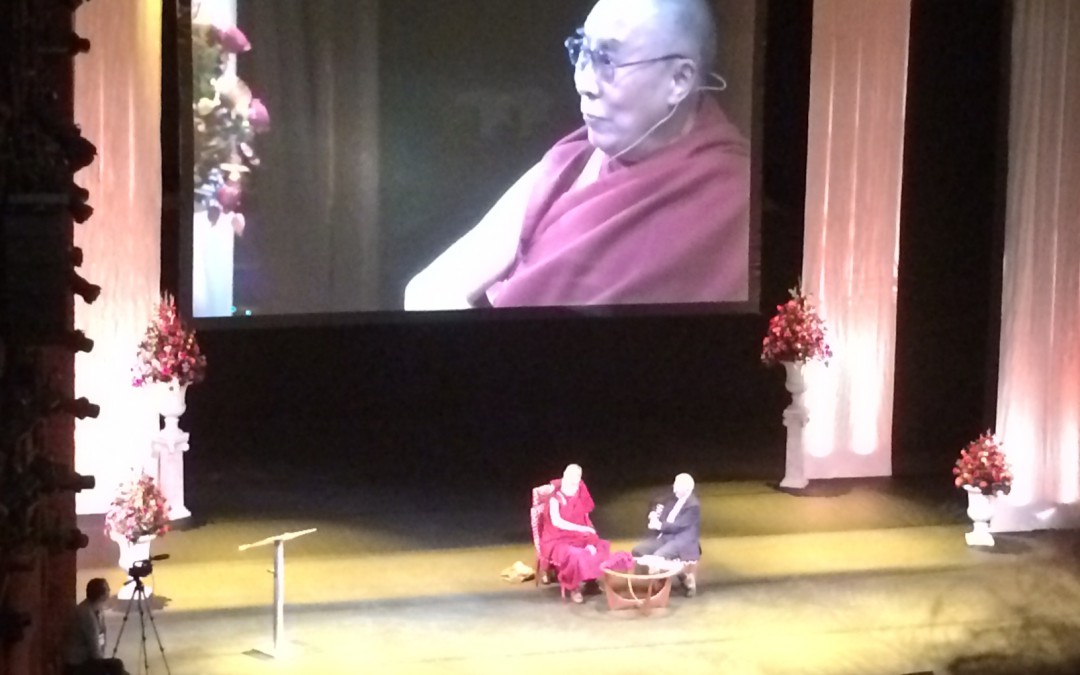I’ve been out and about quite a bit in the past couple of weeks, including going to hear the Dalai Lama (my own picture!) speak at the Action for Happiness event (www.actionforhappiness.org).
This event reminded me that, as Aristotle said:
Happiness is the meaning and purpose of life, the aim and end of all human existence
And then I recalled an evening a few weeks ago when I was out with girlfriends and one of us reflected,
Why do we make it so hard sometimes?
That’s a great question isn’t it? Why don’t we just take the easy route? Why don’t we do only what makes us happy?
We were all able to share examples of where we could make our lives easier, but are choosing not to, some with trivial consequences, some quite significant: burning dinner because we also feel obliged to multi task on something else: persistently staying late at work and missing out on important family moments: taking on a promotion even though we don’t really want it, don’t need the money and know we will be stressed and tired if we do: pushing ourselves to find the time to get our book published even when our life is full already and it would be nice to just chill out (that last one is me by the way!!)
What drives us on sometimes seems to be something other than the pursuit of happiness. Sometimes it can feel that someone else is making it hard for us, but usually it is us making it hard for ourselves. We are making those choices.
But why do we do that? What drives us to make it so hard sometimes?
One idea that has helped me explore this is from a body of work called Transactional Analysis, based on the ideas of Eric Berne. It suggests that, when we are young, we learn how to get the recognition we want from those around us, (Berne calls this recognition strokes), and that whilst we do get some strokes for just being us, we also get strokes for the things that we do. By the age of seven we have tried out lots of behaviours, and the ones that get us the most strokes are the ones we do more of and, if we don’t choose to challenge it, we may carry that way of being with us in to adulthood.
Taibi Kahler builds on this idea by suggesting that some of the messages that we respond to can be captured in what he calls drivers, and he has identified 5 of them:
Please Others: we get strokes if we put others before ourselves
Be Strong: we get strokes if we don’t show our emotions
Be Perfect: we get strokes if what we do is perfect
Try Harder: we get strokes because of the effort we put in (rather than the outcome we achieve)
Hurry Up: we get strokes from doing whatever it is we are doing as quickly as possible
Whilst we have all five within us, we may be driven by some more than others.
You may have a sense of which of these push or pull you most, (and there is lots of exploring to be done in great books like “TA Today” by Stewart and Joines), and of course these drivers do wonderful things for us. We use the strokes we get around each of these to make sense of the world, of ourselves and to get our mojo. Positive strokes give us confidence in what we are doing and negative strokes help us understand what we might want to do differently.
But there is something about these drivers that is insatiable and sometimes we might want to be aware of them and choose to manage them differently.
Do I really need to check my work emails all the time on holiday, or is that my Please Others (around my boss) or my Be Perfect (in front of my colleagues) cutting in? If I don’t want the promotion I could manage my Try Harder and offer myself the choice to turn it down. If I’m cooking the dinner I could choose to quieten my Hurry Up and just enjoy doing one thing at a time. If I am really busy with other things I could quieten my Hurry Up, chill out and accept that the book is not going to get published tomorrow!
And offering myself those choices may help me be happier.
One of the ten keys to happier living, according to Action for Happiness, is being comfortable with who we are. Exploring where we get our strokes and choosing how we get them may help us to be more comfortable. As the Dalai Lama puts it:
Many think that happiness is to be found outside ourselves …., but actually happiness is something that comes from within
And if that’s true then that’s good news. Because then we have control over our happiness and can choose it for ourselves.
We are grown up now and can challenge what we did when we were seven to feel good about ourselves. Now we can choose: we don’t have to make it so hard!
p.s. just an update on last time’s blog. I am very pleased to say that my daughter is settling in well at uni. Thanks to all those who have shared that they have found that blog particularly useful as their young person heads off to university life. I hope they are settling in well too and that, like me, you are getting used to the space that they leave behind.
Thank you for reading this blog. I am enjoying sharing the Choose You Project with you and I love hearing your thoughts, comments and examples of Choose You moments, so do please continue to share them with me, (you can email me at jenny@insight-out.co.uk).

